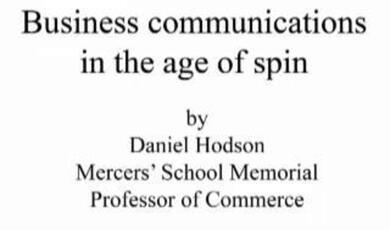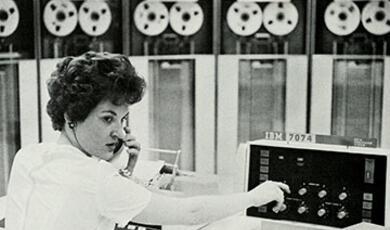Dollarisation and Gresham's Law
Share
- Details
- Text
- Audio
- Downloads
- Extra Reading
Will there in the future be just one or two currencies? An epitome of Sir Thomas Gresham's Law is that bad money drives out good money. In many parts of the world, however,it seems that the opposite is happening, with volatile and inflation-ridden currencies giving way to the US dollar. Was Gresham wrong? Under what conditions does dollarisation and perhaps later Euroisation take place? How far will these currencies spread?
Download Text
Dollarisation and Gresham's Law: Will there in the future be just one or two currencies?
Professor Avinash Persaud
Gresham's Law is one of those few laws, which we may call universal; one that has governed human activity across time and circumstance.
Like many powerful laws of human activity, it is simple enough, yet there are few laws that are so misrepresented or misunderstood. Before we delve into the detail and application of Gresham's Law, I think our picture would benefit from the briefest of backgrounds about the man himself. Just before we do that I would like to thank Stephen Spratt sitting in the audience today for his help in researching tonight's lecture and I would like to express my debt to the work of the few economists and historians who have traversed this area, notably Robert Mundell, Sir Alexander Harris, and Joseph Schumpeter. I also note Charles Goodhart in the audience today, who taught me much of what I know in monetary economics.
Sir Thomas Gresham was born four hundred and eighty five years ago. Writing a little more recently, the great economic historian, Joe Schumpeter, described him in the following way:
"He was a type that can no doubt be found everywhere, but of which the English specimens are to this day so much more frequent and so much superior that it may well be called English: the businessman who is just as much a public servant as he is a businessman and who, though perfectly successful in looking after his own advantage, serves the state in ways that are beyond the competence of the mere public servant."
Gresham was a goldsmith, banker and Mercer. He possessed large estates in Norfolk as well as a palatial house in Bishopsgate, which he later bequeathed to London as the first home of Gresham College. Like his father, Sir Richard Gresham, he became Lord Mayor of London and for many years was the government's chief advisor on matters financial, holding a number of official positions such as royal agent at Antwerp, which was then the centre of European finance. In building his Royal Exchange, which was given the royal appellation by Queen Elisabeth the first, he played a critical role in transferring Europe's financial centre from Antwerp to London. With over $50bn earned every year in the London financial services industry today, we owe him much.
Mention Sir Thomas Gresham to many and it is Gresham's Law that comes to mind, which most know as the dictum, bad money drives out good.
This is, however, incorrect, twice over. Firstly, bad money does not drive out good; quite the opposite. Over a few millennia at least, currencies with virtue, in terms of the stability and strength of their value and their quality of composition; good currencies, have driven out bad currencies.
The Persian daric, the Greek tetradrachma and the Roman denarius did not become the dominant currencies of the ancient world because they were bad.
The florins, ducats and sequins of the Italian city-states did not circulate because they were poor quality coins, they were the highest quality.
The pound sterling up to the First World War and the dollar form the Second did not become the dominant currencies of their time because they were weak and volatile, far from it.
To say that bad money drives out good is a false generalization; but it is also an invalid rendering of Gresham's Law.
The confusion stems partly from the fact that the phrase, bad money drives out good was contained in a royal proclamation of 1560 that was thought to be authored by Sir Thomas. However, a memorandum by Gresham the previous year shows that there was a critical bit left off this phrase. Gresham argued that bad money drives out the good, if they exchange for the same price. I would like to express that in an even more general way that remains in the spirit of Gresham's Law. If no distinction is made between good and bad in one place, the bad will drive out the good in that place.
If for example you had coins of equal weight, one made of gold and one of copper, but because they both had the same £1 stamp from the Royal Mint, both were traded within the country for £1 worth of goods and for each other. Over time the gold coins would be hoarded or used for trade abroad where they could be traded for more than their copper cousins. Internally, copper coins would drive out the gold coins. At first sight this seems, obvious, perhaps even banal, but this simple observation has often been neglected by the authorities, and in its wider application in the field of politics, investment and business, by the rest of us.
One hundred and 31 years after Gresham's memorandum, the greatest men of the age, Sir Isaac Newton and John Locke, were trying to understand why silver coin was leaving the country and in the process deflating the domestic economy. Isaac Newton you may know was for a while the Warden of the Mint. In 1695, so distressed by this continued outflow of bullion, parliament passed an Act which provided the branding and capital punishment of those involved in the exporting of silver coin clippings. On one day seven men were hanged and a woman burnt for this crime.
A re-reading of Gresham's memorandum would have told them that the outflow of bullion would continue, with or without hangings, as long as there was a fixed rate between silver and pounds, for argument sake, that was different in the country than outside, and it was different to the disadvantage of silver inside the country. In those circumstances, people would be content to exchange over valued pound coins for over valued pound coins, but they would rather export their undervalued silver to somewhere they could get more for it than overvalued pounds.
This example also highlights how Gresham's Law is more than the issue of clipped or debased coins, but an equilibrium theory of exchange rates. If the rate of exchange is fixed within a country, at a different rate than it is fixed abroad, then the undervalued currency will be exported, leaving only the overvalued currency.
In addition to the export of bullion whenever it is undervalued internally, Gresham's Law makes another interesting prediction. Discoveries of hoards of currency do not reflect some random forgetfulness by their original owners, but are evidence of periods of financial insecurity where good currency was being hoarded and bad currency circulated. Moreover, the hoards of good currency should be more valuable than the average circulation at the time. Get that metal detector out again.
I made the bold statement at the beginning that Gresham's Law was not an arcane part of monetary theory, but a universal theory of broad application. Forget money and coins for the moment and think of it simply as the statement that if no distinction is made between good and bad in one place, the bad will drive out the good in that place.
Imagine a democracy which is racked by racial and religious divisions. Sadly there are quite a few in our world, including at times, Northern Ireland, Fiji, Guyana, Lebanon, to name just a few. Imagine that politicians are chosen on the basis of their race or religion not on how effective or scrupulous they are. To paraphrase the original law, if no distinction is made between the scrupulous and unscrupulous in politics, the scrupulous will pack it in and the unscrupulous will triumph.
If racism and religious strife can blind democratic systems from the value of choice, it makes it even more important that democracies try to rid themselves of this cancer.
Lets us make another modest change to Gresham's Law to extend it further: if no distinction can easily be made between good and bad, the bad will drive out the good.
Take money management, because there is a large degree of volatility in financial markets there is, over short periods of time, a large amount of randomness about the performance of different fund managers. The longer the period of time, the less this should be the case, but it is quite possible that a good fund manager to have a bad month and a bad fund manager to have a good month. Because the market cannot easily distinguish between the good and bad over the short-term, they pay fund managers the average between what a good or bad fund manager would be worth. This underpays a good fund manager, who may then decide that it's not worth doing the job. The consequence is that you are left with only bad fund managers managing money, and a lot of good fund managers earning more money as traders or corporate raiders or something else.
Lets us take a brief pit stop.
There are many economists who go to great lengths to avoid ever getting their hands dirty with reality. Not so George Akerlof and Joe Stiglitz who won the Noble prize in economics in 2001. One of George Akerlof's most famous pieces of research was called, the market for lemons. Now, this has nothing to do with the peculiarities of selling fruit in California, but instead refers to a bad second hand car, which in America is called a lemon. And just in case you thought this was rather quaint and wondered why economics was called the dismal science, Akerlof's paper explains why there is no such thing as a good second hand car, only lemons.
The problem Akerlof argues is uncertainty. The seller of a second hand car knows whether it is a good or bad car. The buyer, does not. She has not driven it for several years and does not know how it starts in the cold, how often it has been repainted or the fuses blow etc. She does not know if she is looking at a good or bad second hand car. Consequently, she offers a price that sits in the middle of the price for a good car and the price for a bad car. The seller of a lemon knows he is getting a good deal and accepts. The seller of a good second hand car, knows he is not and refuses to sell and after a while withdraws his car from the market, leaving only lemons. It is asymmetric information, adverse selection and uncertainty, but it is also a form of Gresham's Law. If no distinction can easily be made between good and bad, the bad will drive out the good.
Let me conclude, the world is richer place if in commerce we adopt systems of economics, politics, law and business that weeds out the bad from the good. Where these distinctions are not made or are not easily made, be they in investment returns, currency crises, racial politics, art and literature or management ideas, there is a danger that the bad drives out the good.
The first step is to recognize this. The second is to consider the right solution. In some cases the market innovates a solution by itself such as Approved Used Car schemes, or rating agencies for funds, though these tend to only partially cover the market.
In some cases government regulation may be required such as protecting unsuspecting tourists at the airport from unscrupulous taxis. There are areas there is no distinction between good and bad because markets are stifled. There is no market for good or bad non-executive directors because companies' pay the liability insurance for them. There are other areas where the market needs to be reined in, such as contagious currency crises that infect countries with good and bad policies. This makes it harder for politicians to promote good behaviour.
So, Gresham's Law is not just about debased coins or money. It is about asymmetric information, adverse selection and uncertainty. It is about all those concepts considered terribly modern when George Akerlof was awarded the Nobel Prize in 2001. Was Gresham robbed of the Nobel? Well of course it did not exist then. It is true that four hundred and eighty five years ago, Sir Thomas was thinking and writing about substantial ideas that have been recast in more modern times. It is true that in recasting, Gresham's mould has on occasion not received due courtesy and reference.
But it is also true that Gresham was not the first to come up with what we now refer to as Gresham's Law. Not that Gresham ever claimed so. Gresham's Law was first ascribed to Gresham by the economist H. D. Macleod in 1858.
Let me end tonight's lecture with a translation of an extract on the Athenian monetary system from The Frogs by Aristophanes, written in 405 BC, or some 2000 years before Gresham.
Oftentimes have we reflected on a similar abuse,
In the choice of men for office, and of coins for common use;
For your old and standard pieces, valued and approved and tried,
Here among the Grecian nations, and in all the world beside,
Recognised in every realm for trusty stamp and pure assay,
Are rejected and abandoned for the trash of yesterday;
For a vile, adulterate issue, drossy, counterfeit and base,
Which the traffic of the city passes current in their place!
This event was on Thu, 06 May 2004
Support Gresham
Gresham College has offered an outstanding education to the public free of charge for over 400 years. Today, Gresham College plays an important role in fostering a love of learning and a greater understanding of ourselves and the world around us. Your donation will help to widen our reach and to broaden our audience, allowing more people to benefit from a high-quality education from some of the brightest minds.


 Login
Login






